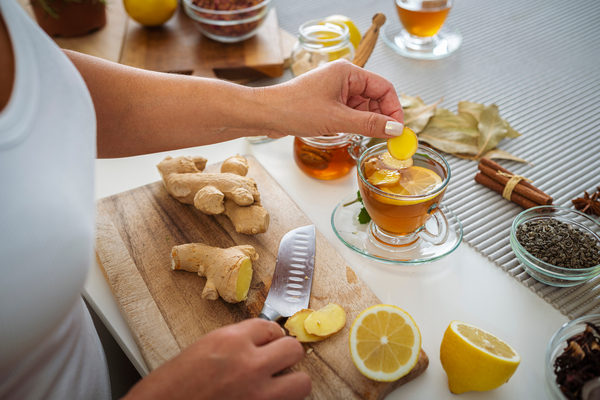Do these winter wellness trends actually work?

When the days get shorter and temperatures drop to teeth-chattering levels, viruses are ready to make their winter debut. But with many people sharing wellness advice and home remedies online, it can be easy to become part of the health hack herd.
“When wellness trends go viral, it’s usually because it works for the people sharing them,” says nib clinical expert, Jo Baja. “But they don’t always work for everyone.”
The good news? You don’t need to follow these trends to stay healthy this winter. We sat down with Jo, our nib clinical expert, to debunk these trends and hear her alternatives that you can do at home this winter.
Flu bomb tea
This homemade remedy is a warm drink made of boiled water, garlic cloves, fresh ginger, a drop of oil of oregano, cayenne pepper, lemon juice and honey. Basically, it’s a lot of tasty anti-inflammatory and vitamin C-rich ingredients all in the one hot brew.
For some people, the flu bomb tea might be comforting to make and drink when sick. This is because the ingredients can help reduce inflammation in the throat and nose and give you a burst of vitamin C.
While this drink might work for some people, maintaining a healthy diet loaded with fruit and veggies can be your fast pass to better health.
“Eating a balanced diet can give you all the essential vitamins and minerals to boost your immunity,” Jo explains. “Getting adequate sleep can play a big part in having a healthy immune system. The Sleep Health Foundation recommends a minimum of seven hours of sleep for an adult.”
High-protein diet
If you exercise regularly and use social media platforms, it’s likely that you’ve been targeted by ads or people promoting protein powders, drinks and snacks as a supplement. We know that protein is an important nutrient for muscle growth and tissue repair and it can help you fight off infections and illness. But how much protein is too much?
According to Better Health, the recommended daily amount of protein is:
5 serves for women aged 19 to 50.
5.5 serves for men aged 19 to 50.
Consuming high amounts of protein (such as 200g to 400g each day) can actually do more harm than good. For example, it could put pressure on your kidneys.
“Paying attention to your fruit and vegetable intake, along with eating a balanced diet that includes the right amount of protein, can support a healthy immune system,” Jo explains.
Cooking healthy meals doesn’t have to break the bank either. You can make low-cost and tasty meals like a vegetarian pasta bake or Greek-style roast chicken. If you’re an nib member, you can enjoy discounts on groceries and meal delivery services through nib Rewards to eat healthier this winter.
Ginger shots
Health shots in recent years have taken over supermarket shelves and seen online as a quick way to boost your immunity. The ginger shot is made from ginger, lemon and cayenne powder, all of which contain a high amount of vitamin C and antioxidants. Because of these ingredients, many people think ginger shots can help fight off infection and improve your skin health.
If you want to try these ingredients at home, then you could incorporate them individually into your weekly menu. You could ditch the morning cuppa for a glass of hot water and lemon. Or you could end the day by having a hearty bowl of warm pumpkin and ginger soup.
“While trendy diets can be tempting, it's a balanced diet that truly supports our health – especially during the winter months. And don’t forget, staying hydrated is just as important, even when it’s cold outside,” Jo says.
Get the facts from a qualified expert
While some of these trends do have some health benefits, Jo suggests chatting with your medical practitioner for tailored advice. She says, “Even though these trends might be holistic and work for some people, the best thing you could do is to get guidance from your GP.”
nib members can access quality and convenient healthcare with medical doctor telehealth through our partner, hub.health. With a vast network of Australian-based medical professionals, you can get expert information on how to be at your healthiest this winter from the comfort of home.
Please note: The information throughout this article serves as broad information and should not replace any advice you have been given by your medical practitioner.